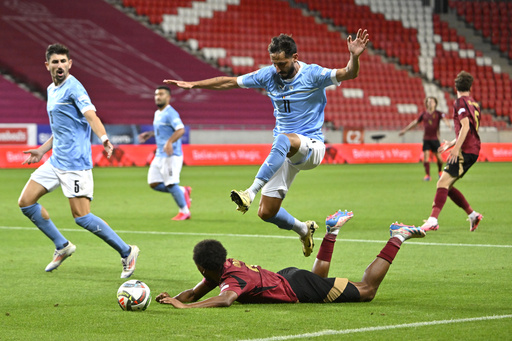The recent violent incidents targeting Maccabi Tel Aviv fans in Amsterdam have sparked serious concerns amongst Israelis about the safety of their sports teams and fans traveling abroad. Many Palestinians are advocating for a complete ban on Israeli teams competing internationally due to the ongoing conflict with Hamas.
Even as Israeli soccer teams continue to participate in domestic matches amidst the Israel-Hamas war, they face restrictions for international fixtures. The European soccer authority, UEFA, has declared that Israel is unable to host these games because of the ongoing conflict.
Supporters of the Palestinian movement have criticized FIFA for not implementing a ban on Israel similar to the one imposed on Russian national teams shortly after the Ukraine invasion in 2022. UEFA also took swift action against Russian teams during the same period.
In light of these hostilities, Israeli teams have been conducting their home games in venues located in Hungary, Serbia, and Cyprus. Notably, Hungarian Prime Minister Viktor Orbán has established himself as a strong ally of Israeli Prime Minister Benjamin Netanyahu, promoting Hungary as a safe haven for Jewish individuals in Europe. Orbán has prohibited demonstrations supporting Palestinian causes, claiming they pose a safety risk.
This season, Israel’s national soccer team has been utilizing the Bozsik Arena in Budapest for its home matches in the Men’s Nations League. Maccabi Tel Aviv, the only Israeli men’s club participating in European competitions this season, has played its home games in Szombathely, Hungary, and Belgrade, Serbia.
Concerns extend to away games as well; Belgium recently turned down a request to host a Nations League match against Israel, leading to its relocation to Hungary with no fans present. Although previous away games have occurred without any issues, the violence in Amsterdam raises new concerns not only for soccer but also for other sports.
In a proactive move, Israel’s National Security Council has advised citizens against attending a basketball match featuring Maccabi’s team in Bologna, Italy, to avoid displaying Israeli or Jewish identifiers openly. Italian authorities announced heightened security measures for the game to ensure the safety of both fans and the Maccabi team.
Before the Amsterdam attacks, UEFA already decided to shift Maccabi’s upcoming Europa League match, originally slated for Istanbul, to a neutral location based on Turkish government directives. Meanwhile, the Israeli men’s national soccer team is set to compete against France in the Nations League this Thursday at the Stade de France, with French officials confirming that safety measures would be in place to protect attending fans.
Assaf Nachum, a spokesperson for Israel’s Beitar soccer club, stated that Israeli fans would need visible security presence in Paris to feel comfortable attending. He expressed skepticism about whether many Israelis would choose to travel given the recent events in Amsterdam.
This isn’t the first time Israeli athletes have faced backlash during international competitions. At the Paris Olympics, while security was tightened, Israeli delegations encountered hostile reactions, including jeers during the national anthem.
Incidents of anti-Israel demonstrations at sports events have also intensified this year, with examples including pro-Palestinian protests during Maccabi soccer’s matches against Steaua Bucharest and Braga. Both teams were subsequently fined due to the unsportsmanlike conduct of their fans who displayed Palestinian flags.
Earlier this September, a group of Italian fans turned their backs in protest during the Israeli national anthem at a match in Budapest. In another instance, a pro-Palestinian protester disrupted a Women’s European Championship qualifier match between Scotland and Israel in Glasgow, where he managed to chain himself to the goalpost despite the match being played without spectators for safety concerns.
The Palestinian soccer federation has made repeated appeals to FIFA, seeking Israel’s suspension from international competitions over alleged violations of international law related to the occupation of Palestinian territories, particularly concerning the situation in Gaza. The federation emphasized the destruction or damage to its soccer infrastructure, including its prominent Al-Yarmuk stadium. Although FIFA did not impose a suspension in October, it is considering a disciplinary investigation regarding possible discrimination by Israeli authorities.
Additionally, the Palestinian soccer federation has long urged FIFA to take action against the Israeli soccer association for including teams from West Bank settlements within its leagues.
The prospect of Israel facing a ban similar to Russia’s situation is a pressing topic in sports. Russia was excluded from the European soccer landscape as a fallout from its actions in Ukraine, a scenario that FIFA recognized could lead to chaotic repercussions had Russia advanced in the World Cup qualifying rounds.
As it stands, no European federation has yet refused to compete against Israeli national or club teams, which have been part of UEFA for three decades.
Israel’s men’s team is slated to participate in the upcoming draw for European qualifying groups for the 2026 World Cup on December 13 in Zurich, with the next tournament jointly hosted by the United States, Canada, and Mexico. In contrast, Ukraine’s national and club teams have not been able to host international games on home soil due to the circumstances instigated by the ongoing war.




